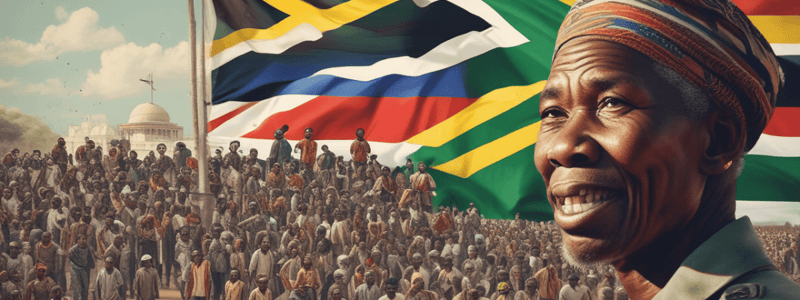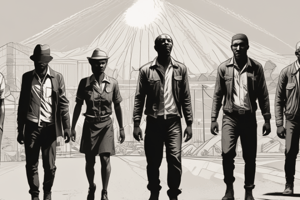Podcast
Questions and Answers
What was the primary purpose of the apartheid government's policies of promoting bilingualism and controlling radio and television?
What was the primary purpose of the apartheid government's policies of promoting bilingualism and controlling radio and television?
- To improve communication between the government and all citizens
- To encourage the use of indigenous African languages
- To foster cultural diversity and understanding
- To cultivate white fear and portray the ANC as a communist front (correct)
Why did some members of the black elite in the homelands cooperate with the apartheid government's policies?
Why did some members of the black elite in the homelands cooperate with the apartheid government's policies?
- They were offered high-ranking positions in the homeland bureaucracies (correct)
- They genuinely believed in the government's vision for separate development
- They were coerced and threatened by the government
- They wanted to gain independence and self-governance for their homelands
Which of the following best describes the status of the ANC and its leaders in the years following the Rivonia Trial in 1964?
Which of the following best describes the status of the ANC and its leaders in the years following the Rivonia Trial in 1964?
- They continued to lead a strong, public resistance movement against apartheid
- They focused on building international support and pressure against the apartheid regime
- They went underground and their activities were suppressed by the government (correct)
- They were allowed to operate freely and participate in the government's homeland system
Which of the following best characterizes the relationship between the apartheid government and the independent homelands?
Which of the following best characterizes the relationship between the apartheid government and the independent homelands?
What was the primary motivation behind the apartheid government's policies of deliberately dividing blacks into separate ethnic and racial groups?
What was the primary motivation behind the apartheid government's policies of deliberately dividing blacks into separate ethnic and racial groups?
How did the apartheid government portray the ANC in its propaganda efforts?
How did the apartheid government portray the ANC in its propaganda efforts?
What was the significance of the Transkei becoming the first black homeland to accept its independence?
What was the significance of the Transkei becoming the first black homeland to accept its independence?
What was the primary reason for the extreme security laws that made it illegal to publish or talk about the ANC and mass resistance in the 1950s?
What was the primary reason for the extreme security laws that made it illegal to publish or talk about the ANC and mass resistance in the 1950s?
What was the primary motivation behind the apartheid government's promotion of exclusively white national sports teams and cultural events?
What was the primary motivation behind the apartheid government's promotion of exclusively white national sports teams and cultural events?
What was the primary reason for the apartheid government's efforts to portray the ANC as a front for Soviet communism?
What was the primary reason for the apartheid government's efforts to portray the ANC as a front for Soviet communism?
After 1977, the remaining BC leaders were divided over what strategies to follow next. Many had begun to feel that BC had fulfilled its ______ and that the best way to proceed in the struggle against apartheid was to re-establish links with ANC structures both in exile and increasingly underground in SA.
After 1977, the remaining BC leaders were divided over what strategies to follow next. Many had begun to feel that BC had fulfilled its ______ and that the best way to proceed in the struggle against apartheid was to re-establish links with ANC structures both in exile and increasingly underground in SA.
During the 1980s, many of the leaders that emerged in the non-racial UDF, ANC, and trade unions were activists that had cut their political teeth in the ______.
During the 1980s, many of the leaders that emerged in the non-racial UDF, ANC, and trade unions were activists that had cut their political teeth in the ______.
In 1978, a group of BC leaders formed the Azanian People’s Organisation (AZAPO). By 1979, state repression had restored the appearance of ______.
In 1978, a group of BC leaders formed the Azanian People’s Organisation (AZAPO). By 1979, state repression had restored the appearance of ______.
By 1979, the struggles of the youth, the communities, and workers in the factories were slowly coming together. The legacy of Black Consciousness on South African politics does not lie in the organisations it created, but in the ideas it ______.
By 1979, the struggles of the youth, the communities, and workers in the factories were slowly coming together. The legacy of Black Consciousness on South African politics does not lie in the organisations it created, but in the ideas it ______.
Meanwhile, the forces of resistance were beginning to devise new ______.
Meanwhile, the forces of resistance were beginning to devise new ______.
Flashcards are hidden until you start studying




